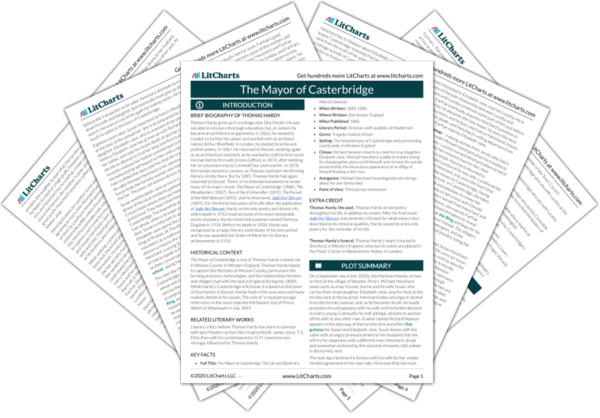Self-Destruction
Throughout the novel, protagonist Michael Henchard makes decisions while drunk, angry, proud, or jealous. These choices ultimately harm Henchard himself and lead to the loss of his family, his fortune, and his position in society. The novel opens with Michael Henchard’s cruel act of selling his wife Susan and child Elizabeth-Jane while he is drunk. Henchard’s drinking early in the novel causes an emotional riff between himself and his wife, and allows her to happily…
read analysis of Self-DestructionFamilial and Romantic Love
The plot of the novel is frequently driven by complex truths about characters’ family relationships, which are hidden and revealed. Early in the novel, Michael Henchard wishes to remarry Susan for his daughter’s sake, but once Henchard learns that Elizabeth-Jane is not his daughter by blood, he no longer cares for her. For Henchard, ties of blood are strongest. Richard Newson also cares deeply for his own offspring, as he seeks out Elizabeth-Jane and goes…
read analysis of Familial and Romantic LoveLoyalty to Duty and Commitments
Loyalty is a defining aspect of the characters Elizabeth-Jane and Susan in this novel. Both women fulfill the expectations of their duties as women, wives, and daughters, while also upholding their past commitments. Duty in the novel is any abstract idea of what is expected of an individual because of her or his position in society. Commitments are any specific agreements made in the past above and beyond one’s duties.
After Susan remarries Henchard…
read analysis of Loyalty to Duty and Commitments
Humans and Nature
The natural landscape of the English countryside is the source of livelihood for the inhabitants of Casterbridge. The chance occurrences of nature impact human fates and outcomes in the novel. A bad harvest causes Henchard to lose money reselling his grain when he attempts to drive Farfrae out of business. Henchard angrily says to Jopp after his loss, “you can never be sure of weather till ‘tis past.” Weather, although uncertain, hurts some and helps…
read analysis of Humans and NatureThe Past and Forgiveness
Throughout the novel, the darkness of past events haunts individual characters as well as the landscape of the countryside around Casterbridge. The ancient Roman history of the region is referenced multiple times. The Ring, where Henchard meets both Susan and Lucetta is an ancient architectural remnant that once served as an amphitheater for violence and entertainment. In the time period of the novel, the Ring is used only for furtive meetings, primarily of a…
read analysis of The Past and ForgivenessCharacter
The full title of the novel is The Mayor of Casterbridge: The Life and Death of a Man of Character. Henchard’s “character” is neither good nor evil, but complex. Character directly impacts each person in the novel. Henchard’s self-destruction is a critical aspect of his character. His self-harming personality traits lead to his isolation and poverty. Elizabeth-Jane and Susan are loyal characters. They honor their duties and their past commitments, which leads Susan…
read analysis of Character






